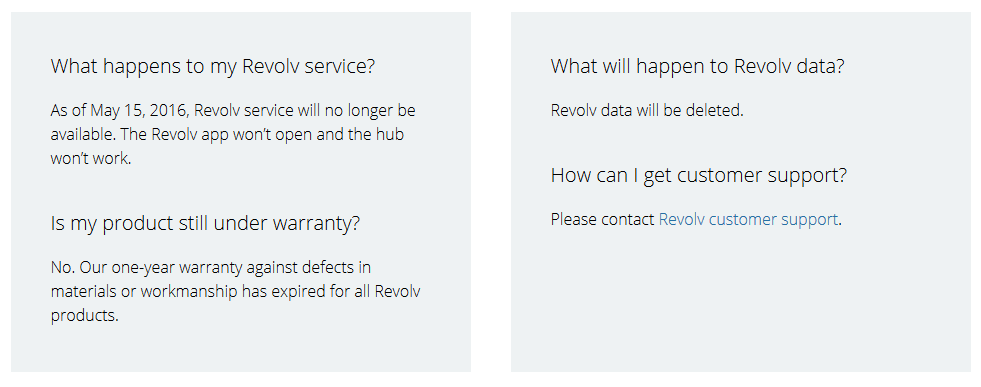I Love You, You Pay My Rent
No, you don’t own that Internet of Things device, you’re just renting it. With renting must come great trust that the manufacturer won’t be acquired by a larger company, which had just recently itself been acquired by one of the largest companies of them all, which will then decide that it will go ahead and permanently switch off that snazzy household hub you thought you owned. More fool you.
The companies involved are, in this order, Revolv, Nest and Google. The product is a hub which acts as a controller for many connected devices in the home – lights, kettles, thermostats and so on.

From revolv.com, 7th April 2016
This is more than just a bit awkward and doesn’t bode well for people actually trusting tech companies to deliver the connected home of their dreams. (Wait, have people actually been dreaming about this?)
Google has a long history of shutting things down when they don’t work out the way Google had hoped. This isn’t in any way unusual in a successful business with multiple product lines that boast billions of customers worldwide. Strategic imperatives change, project champions are reassigned or leave the company entirely. Heck, things get ditched by Google because their videos are starting to creep the Internet out.
“There’s excitement from the tech press, but we’re also starting to see some negative threads about it being terrifying, ready to take humans’ jobs,” wrote Courtney Hohne, a director of communications at Google and the spokeswoman for Google X.
Having said all that, surely customers could expect a product not to be unilaterally switched off by the company that made it, or in this case the one that has inherited the obligations of the company that made it?
For a lot more about what may or may not be going on at Nest, it was covered in a fair bit of detail on the Jay & Farhad Show not that long ago.
https://soundcloud.com/jay-yarow/trouble-at-nest
Yum Yum
As software continues to eat the world, this leaves your average consumer in a bit of a bind when going about their dutiful business of consuming. When previously making purchase decisions about commonplace household devices they didn’t have to consider whether they trusted the manufacturer not to switch the thing off entirely at some unspecified time in the future.
We have recently become accustomed to shortened product lifecycles mostly through the galloping progress of mobile devices, moving rapidly from portable two-way communications tool to indispensable digital servant, companion and familiar. The industry’s marketing efforts are almost all directed to promoting the improvements available in the new versions of their devices. Longevity of any device or the software that makes it function is alien. In that world 18 months is now seen as a reasonable enough expectable lifespan for a product. Keen early adopters can easily find reasons to upgrade their phones on a much shorter cycle.
Built in obsolescence has been a thing that manufacturers have half-heartedly tried to deny for close on a century now, ever since the Phoebus cartel of light bulb manufacturers brazenly created the concept in 1924. The damn light bulbs were just too well made to be profitable enough. Members of the cartel were fined if their bulbs worked for too many hours.
☞ There Is A Light That Never Goes Out (99% Invisible podcast, 16 minutes)
The cloud isn’t magic – it’s just someone else’s hard drive*.
What is the ownership model anyway? As a consumer you own the device, but not the service? So if the hardware in your house requires the continued existence of the service, and Google decides to kill the service then you’re just plain out of luck? That seems … decidedly unfair. Not illegal, obviously, because you read through the massively long EULA, right?
You would expect your car to keep working far longer than 18 months after manufacture of the model is discontinued. Although your car can now be disabled remotely if you don’t keep up the repayments.
Are we customers suffering from an outmoded way of thinking about ownership and simply haven’t caught up with the companies who understand that they are renting these things to us, but are not yet entirely upfront about telling us?
As software and hardware are now fully intertwined, with hardware devices like the Revolv hub requiring not just onboard software and an Internet connection to function, but also other software remotely located on someone else’s servers, what else could we predict might be switched off with little warning? Google’s much discussed self driving car? Smaller devices like Chromecasts?
I can’t imagine Apple or Samsung taking a decision to do something like this. They are both historically hardware companies first and foremost, with software and services to support this hardware. Google is a software and services company which is relatively new to hardware. It is hard to tell whether Google will modify its approach to connected hardware and provide guarantees of device lifespan from time of purchase, or whether other hardware manufacturers will learn from Google that switching off the servers is a very effective way of reducing support costs for a product line to near zero.
